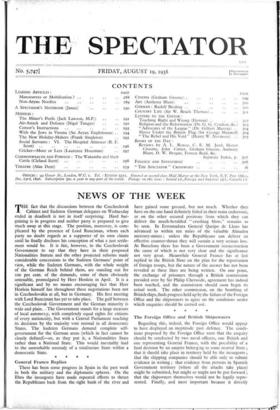NEWS OF THE WEEK T HE fact that the discussions between
the Czechoslovak Cabinet and Sudeten German delegates on Wednesday ended in deadlock is not in itself surprising. Hard bar- gaining is in progress and neither party is prepared to give much away at this stage. The position, moreover, is com- plicated by the presence of Lord Runciman, whom each party no doubt regards as a supporter of its own claims until he finally discloses his conception of whit a just settle- ment would be. It is fair, however, to the Czechoslovak Government to say that they have in their proposed Nationalities Statute and the other projected reforms made considerable concessions to the Sudeten Germans' point of view, while the Sudeten Germans, with the whole weight of the German Reich behind them, are standing out for Ioo per cent. of the demands, some of them obviously untenable, promulgated by Herr Henlein in April. It is a significant and by no means encouraging fact that Herr Henlein himself has throughout these negotiations been not in Czechoslovakia at all, but in Germany. His first meeting with Lord Runciman has yet to take place. The gulf between the Czechoslovak Government and the German minority is wide and plain The Government stands for a large measure of local autonomy, with completely equal rights for citizens of every nationality, but with a Central Parliament reaching its decisions by the majority vote normal in all democratic States. The Sudeten Germans demand complete self- government for the German areas (which in fact cannot be clearly defined)—or, as they put it, a Nationalities State rather than a National State. This would inevitably lead to the unworkable anomaly of a totalitarian State within a democratic State.
* * * *






































